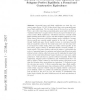653 search results - page 6 / 131 » Partial equilibrium logic |
CADE
1994
Springer
13 years 11 months ago
1994
Springer
Even though it is not very often admitted, partial functions do play a significant role in many practical applications of deduction systems. Kleene has already given a semantic acc...
IROS
2006
IEEE
14 years 1 months ago
2006
IEEE
— Vision-based control of wheeled vehicles is a difficult problem due to nonholonomic constraints on velocities. This is further complicated in the control of vehicles with drif...
ATAL
2005
Springer
14 years 1 months ago
2005
Springer
We present the agent programming language POGTGolog, which combines explicit agent programming in Golog with game-theoretic multi-agent planning in a special kind of partially obs...
CORR
2004
Springer
13 years 7 months ago
2004
Springer
Abstract. The classical propositional logic is known to be sound and complete with respect to the set semantics that interprets connectives as set operations. The paper extends pro...
CORR
2007
Springer
13 years 7 months ago
2007
Springer
Abstract. Sequential game and Nash equilibrium are basic key concepts in game theory. In 1953, Kuhn showed that every sequential game has a Nash equilibrium. The two main steps of ...

